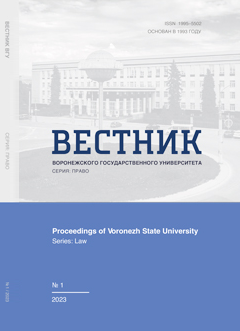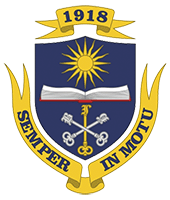Оптимальная модель правового регулирования в сфере искусственного интеллекта
Аннотация
Отмечается, что существуют три основных варианта правовой регуляции искусственного интеллекта: 1) модели «мягкого» правового регулирования, представляющие набор норм, носящих рекомендательный характер; 2) модели «жесткого» регулирования в сфере искусственного интеллекта, их содержание составляют нормы права, закрепленные исключительно в законах и других нормативных правовых актах; 3) «смешанные» модели, характеризующиеся тем, что в них используются как рекомендательные нормы общественных организаций, так обязывающие и запрещающие нормы права, исходящие от государства. Говорится, что Россия пошла по первому пути, приняв Кодекс этики в сфере искусственного интеллекта. Определены основные причины принятия данного кодекса, обозначены плюсы и минусы выбранной в России модели правового регулирования в сфере искусственного интеллекта, указаны возможные риски такой регуляции. Сделан вывод, что оптимальной модели, применяемой в государствах с различными правовыми системами, без учета их особенностей создать невозможно. Однако одна и та же модель в одной правовой системе может работать продуктивно, а в другой – станет давать серьезные сбои либо действовать идеально только до определенного момента, после чего ее необходимо будет модернизировать либо менять полностью.
Скачивания
Литература
Arzamasov Yu. G. Theory and practice of departmental rule-making in Russia : monograph. Moscow, 2013. Arzamasov Yu. G. Legal constructions of mixed departmental legal acts // Legal technique. 2013. No. 7, part 2. P. 101–111.
Arzamasov Yu. G. Compliance as a type of anti-corruption monitoring // Actual problems of combating crimes and other offenses. Part 2. Barnaul : Barnaul Law Institute of the Ministry of Internal Affairs of the Russian Federation, 2022. P. 6–8.
Arzamasov Yu. G., Nakonechny Ya. E. The concept of monitoring normative legal acts. Moscow, 2011.
Arzamasov Yu. G., Nakonechny Ya. E. Monitoring in lawmaking: theory and methodology. Moscow, 2009. Bakshtanovsky V. I., Sogomonov Yu. V. Civil society: ethics of public arenas : monograph. Tyumen : Research Institute of Applied Ethics of TSOGU, 2004. P. 11.
Baranov V. M., Mushinsky M. A. Monitoring the defectiveness of normative legal acts // Legal Science and practice: Bulletin of the Nizhny Novgorod Academy of the Ministry of Internal Affairs of Russia. 2011. No. 1. P. 79–88.
Baranov P. P. Legist positivism in modern Russia // Severo-Caucasian Legal Bulletin. 2015. No. 1. P. 9–15.
Bachilo I. L. Legal monitoring – an information resource for improving lawmaking // Proceedings of the Institute of State and Law of the Russian Academy of Sciences. 2009. No. 5. P. 185–204.
In Russia, with the participation of the HSE, the Code of Ethics of Artificial Intelligence was developed and signed. URL
Varlamova N. V. Legal positivism and human rights // Social sciences and modernity. 2008. No. 1. P. 156–166. WASEDA University. Institute of Digital Government. URL
Vasilkova V. V., Koltsov A. I. Crowdsourcing as a new socio-communicative technology // Discussion. 2015. No. 7 (59). P. 78–84.
Garmaev Yu. P., Ivanov E. A., Markuntsov S. A. Anticorruption compliance in the Russian Federation: interdisciplinary aspects. Moscow, Jurisprudence, 2020.
Goryan E. V. Prospects for the use of artificial intelligence in the financial and banking sector: Singapore experience // The territory of new opportunities. Bulletin of the Vladivostok State University of Economics and Service. 2020. Vol. 12, no. 3. P. 86–99.
Kashin V. B. Chinese reforms of military innovation management systems: a response to the American "third compensation strategy"? // Bulletin of the Moscow University. Series 25: International relations and world politics. 2017. No. 4. P. 42–66.
Kashkin S. Yu. Legal regulation of the use of artificial intelligence and robotics technologies as an emerging new complex branch of law in the most representative states and international integration associations: problem statement // Bulletin of the Russian New University. Series: Man and Society. 2019. No. 3. P. 134–144.
Kivlenok T. V. Mixed legal acts : monograph. Vladimir, 2010. Konev S. I., Tsokova B. A. Ethical and legal problems of regulation of artificial intelligence and robotics in domestic and foreign law // Education. The science. Scientific personnel. 2020. No. 4. P. 68–73.
Kutafin O. E. Gaps, analogy and defects in constitutional law // Lex Russica. Scientific works of MGUA. M. : Publishing House of MGUA. 2007. No. 4. P. 610–622.
Mateikovich M. S. Defects of constitutional and legal regulation in the Russian Federation // State and law. 2007. No. 12. P. 15–21. Neshataeva T. N. International Organizations and Law. New trends in international legal regulation. Moscow, 1998. P. 108.
Normography: theory and technology of rulemaking : textbook for universities / Yu. G. Arzamasov et al. ; ed. Y. G. Arzamasov. Moscow : Yurayt, 2020. General theory of law and the State: Textbook / ed. V. V. Lazarev. M., 1994.
General theory of law: course of lectures / ed.V. K. Babaev. N. Novgorod, 1993. Ponkin I.V., Redkina A.I. Artificial intelligence from the point of view of law // Bulletin of the Peoples' Friendship University of Russia. Series: Legal Sciences. 2018. Vol. 22, no. 1. p. 93.
Legal regulation of artificial intelligence in the conditions of pandemic and infodemia: monograph / eds. V. V. Blazheev, M. A. Egorova. M. : Prospect, 2022.
Legal monitoring: a scientific and practical manual / eds. Yu. A. Tikhomirov, D. B. Gorokhova. M., 2009.
Redko A. A. Legal initiative in the mechanism of action of modern Russian law : dr. legal sci. diss. Volgograd, 2023.
Sungurov A. Yu., Tinyakov D. K. Administrative reform and its projects in modern Russia: were there coalitions of support? // General sciences and modernity. 2016. No. 2. P. 39–51.
Tikhomirov Yu. A. Introduce monitoring of law // Law and economics. 2004. No. 3.
Tlembayeva Zh. U. On some issues of legal regulation of the use of artificial intelligence technology in the conditions of digital transformation // Proceedings of Voronezh State University. Series: Law. 2021. No. 4 (47). P. 331–349.
Formation and development of branches of law in the historical and modern legal reality of Russia : in 12 vols. : monograph / eds. R. L. Khachaturova, A. P. Shergina. Moscow : Yurlitinform, 2022. Vol . VIII : Administrative Law in the system of modern Russian law.
Kharitonova Yu. S. Legal regulation of the use of artificial intelligence technology // Journal of Applied Research. 2021. No. 1-2. P. 72–80.
Chernogor N. N., Zaloilo M. V. Legal monitoring: instrumental value and vectors of development // Bulletin of the Moscow State Regional University. 2018. No. 3. P. 8–21.
Shevchenko I. L. Corporate culture as a mechanism of corporate governance in Russian companies // Bulletin of SUSU. Series: Economics and Management. 2016. Vol. 10, no. 4. P. 116–121.
Yampolskaya Ts. A. On legal acts of the Council of the National Economy // Sov. gos. i pravo. 1960. No. З11. P. 86–93.
Yani P. S., Prokhorov N. V. Anti-corruption compliance in the criminal and legal sphere: a meaningful element // Russian Justice. 2018. No. 9. P. 54–57.
Companion to the Model AI Governance Framework – Implementation and SelfAssessment Guide for Organizations // Personal Data Protection Commission Singapore: [сайт]. Available from: http://go.gov.sg/ ISAGO (accessed: 19.03.2023).
Georgieva Z. Soft Law in EU Competition Law and its Judicial Reception in Member States: A Theoretical Perspective // German Law Journal. 2015. No. 16 (2). P. 223–260.
Gold J. Strengthening the Soft International Law of Exchange Arrangements // American Journal of International Law. 1983. Vol. 77, no. 3. P. 443–489.
Schwarzenberger G. Power Politics. // A Study of World Society. Leningrad, 1964. 154 p.
Weil P. «Vers une normativité relative en droit international?» // RGDIP. 1982. No. 86. P. 5–47.
Wu F. Towards a new generation of artificial intelligence in China // Nature Machine Intelligence. 2020. Vol. 2, no. 6. P. 312–316.










